The Future of E-Commerce: How AI and Social Commerce Are Changing the Way We Shop
"One of the most important trends to watch in 2023 is the rise of AI. AI is already being used in various ways to improve the e-commerce experience, from personalised product recommendations to chatbots that can answer customer questions. As AI continues to develop, it will play an even more important role in driving traffic and sales on Shopify stores. So if you're not already using AI in your e-commerce business, now is the time to start."
In the fast-paced world of e-commerce, technology and SEO trends change rapidly. The Shopify platform continues to evolve, providing its users with new opportunities to enhance visibility and boost sales. As we dive into 2023, it's time to update your strategies with the latest best practices, including leveraging technology, social media platforms like TikTok, and new AI services. Here's how you can upgrade your Shopify strategies:
1. Optimize Your Shopify Store for Search Engine Traffic
SEO remains at the forefront of organic traffic generation, but the practices have evolved. Comprehensive keyword research, based on users' intent and behaviour, is still vital. Use AI-powered tools for more precise keyword analysis and to understand the semantical context of search queries. Voice search optimisation is also gaining momentum, so make sure to include long-tail keywords in a conversational tone.
Remember to incorporate keywords naturally in product descriptions, titles, alt tags, and meta descriptions. Schema markup, a form of micro-data, can help search engines understand your content better and improve your site's visibility in SERPs.
Detailed keyword research lays the foundation for SEO. Tools like SEMrush or Ahrefs provide comprehensive keyword insights, including search volume, difficulty level, and keyword variations. For instance, if you're selling "organic skincare," these tools will provide related keywords like "vegan skincare," "cruelty-free skincare," etc.
Voice search optimisation is another critical aspect. With the increasing use of voice assistants like Alexa and Siri, more people are using voice commands to search online. You can optimise for voice search by including long-tail keywords and questions that people might ask, such as, "What is the best organic skincare product for sensitive skin?"
Schema markup helps search engines understand your content better and present it more attractively in SERPs. You can add product schema to your Shopify store using apps like SEO JSON-LD Boost by Verge or Schema Plus for SEO.
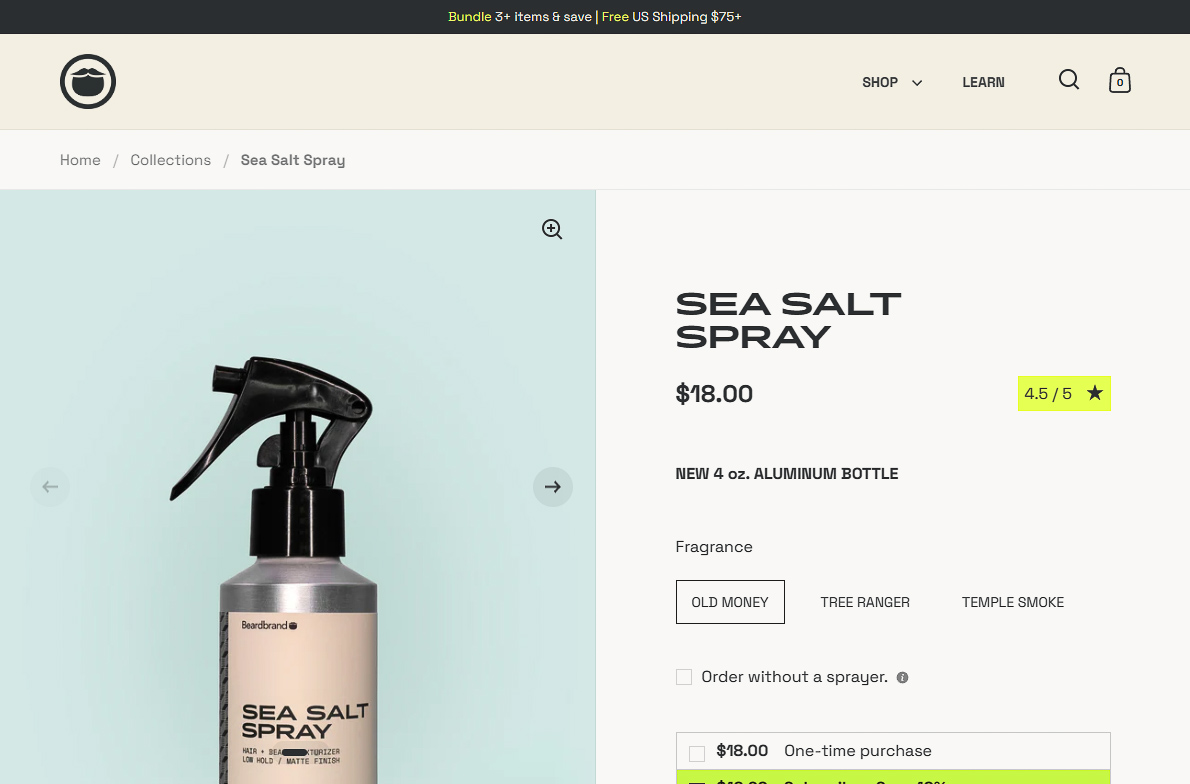
Example: Beardbrand is a Shopify store with excellent SEO practices. They effectively use keywords in their product descriptions, blog posts, and even image alt tags.
2. Leverage Unique, High-Quality Content
Content is still king in 2023. However, it's essential to create value-driven, unique content that resonates with your audience and helps in decision-making. AI-based content generation tools can help create compelling product descriptions and blog posts. Optimise your content with LSI (Latent Semantic Indexing) keywords for better visibility.
Also, consider using AI-based content optimisation tools that provide real-time SEO suggestions and readability scores to improve your content quality further.
Ensure your content is unique, engaging, and offers value to your audience. AI tools like Copy.ai or Jasper can help generate creative product descriptions, ad copies, and more. Tools like Surfer SEO can guide you on content optimisation based on SERP analysis.
LSI keywords are related terms to your primary keyword. For example, if your primary keyword is "vegan skincare," LSI keywords can be "plant-based skincare," "animal-friendly beauty products," etc. You can find LSI keywords using tools like LSI Graph.
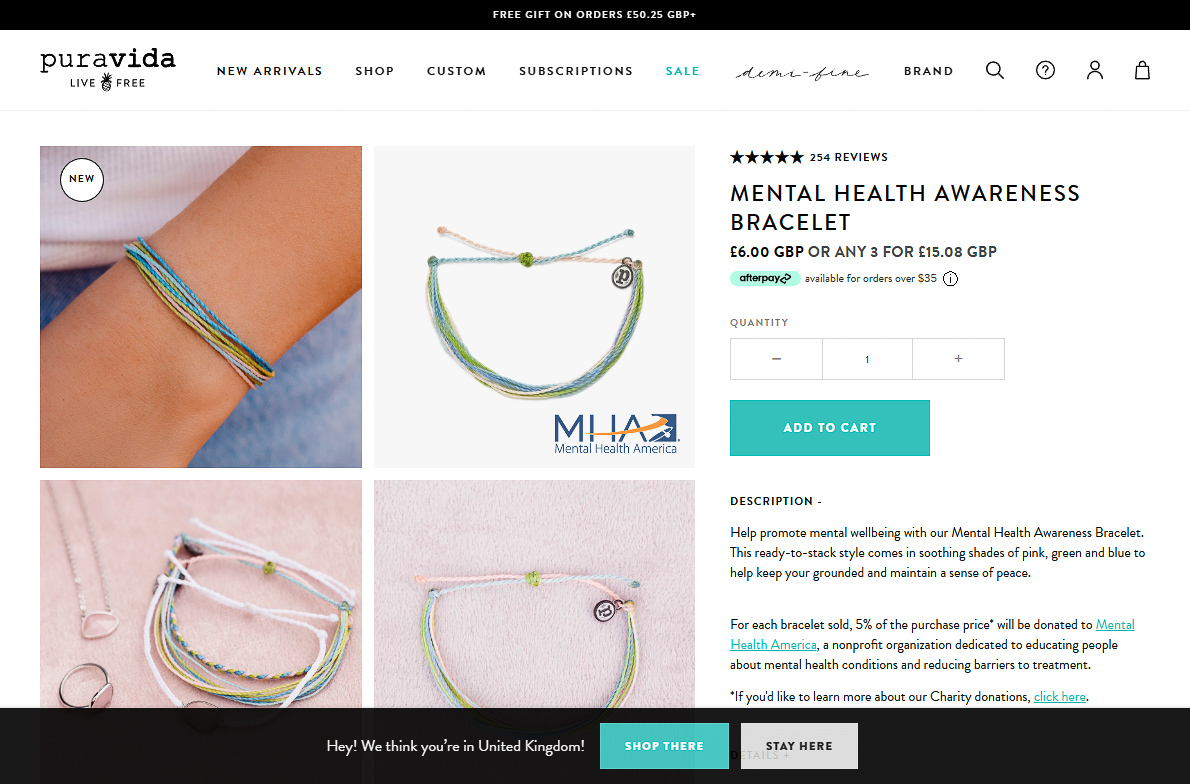
Example: Pura Vida Bracelets uses engaging, well-optimised content across their Shopify store, including product descriptions and blog posts.
3. Build a Robust Backlink Profile Through Guest Posting
In 2023, back links remain a strong ranking factor. Guest posting on high-authority sites in your niche can help build a robust backlink profile. Consider leveraging AI-powered outreach tools to find sites accepting guest posts and manage your outreach efforts.
You can use tools like BuzzSumo or Hunter.io to identify high-authority blogs in your niche that accept guest posts. Write quality articles for these blogs and include a link back to your site in the author bio or the content if permitted.
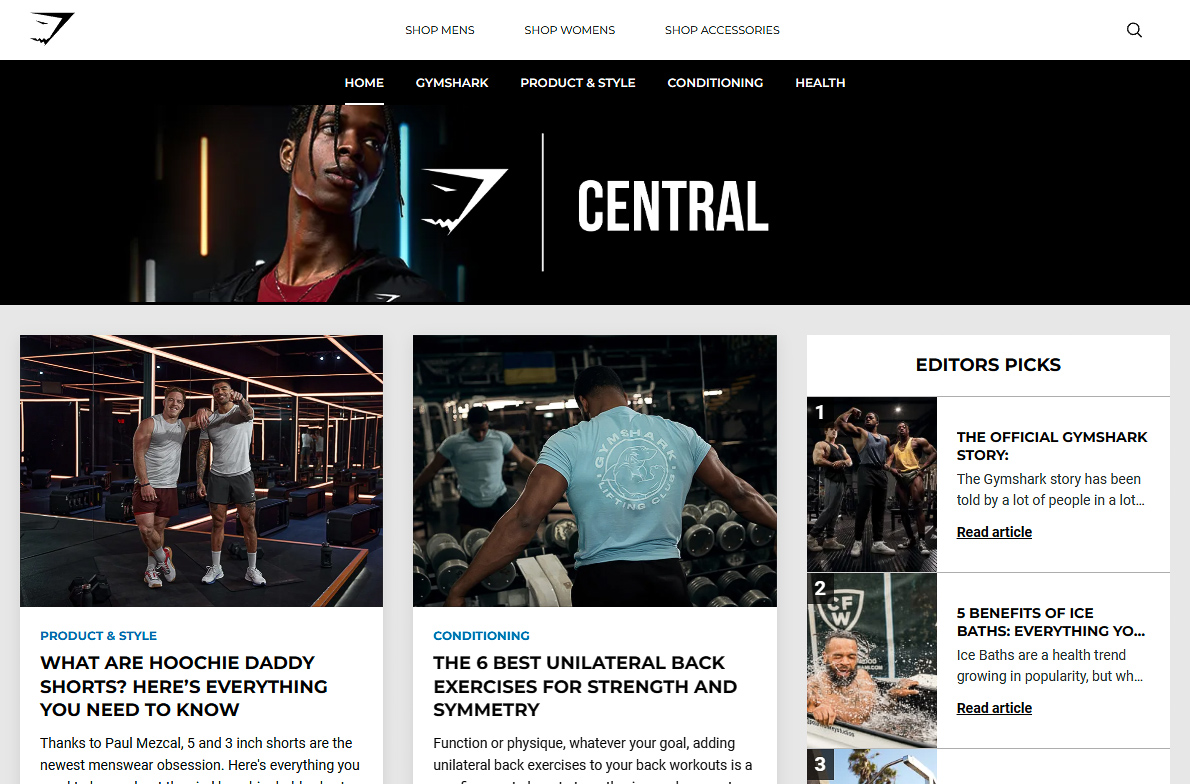
Example: Gymshark, a fitness apparel Shopify store, regularly contributes to health and fitness blogs, building a strong backlink profile.
4. Collaborate with Influencers and Industry Experts
Influencer marketing has expanded to platforms like TikTok, which has a massive Gen-Z and millennial user base. Collaborate with influencers on TikTok for promotional campaigns, unboxing videos, and product reviews. Incorporate a mix of micro and macro-influencers for a diverse outreach strategy.
Additionally, consider doing expert roundup posts featuring thoughts and advice from industry influencers. Such posts offer value to your audience and have a high shareability factor, contributing to your site's visibility.
Identify influencers in your niche using platforms like Heepsy or Upfluence. Collaborate with them for promotional campaigns, tutorials, product reviews, etc. Also, consider creating expert roundup posts where you can feature advice from industry experts.
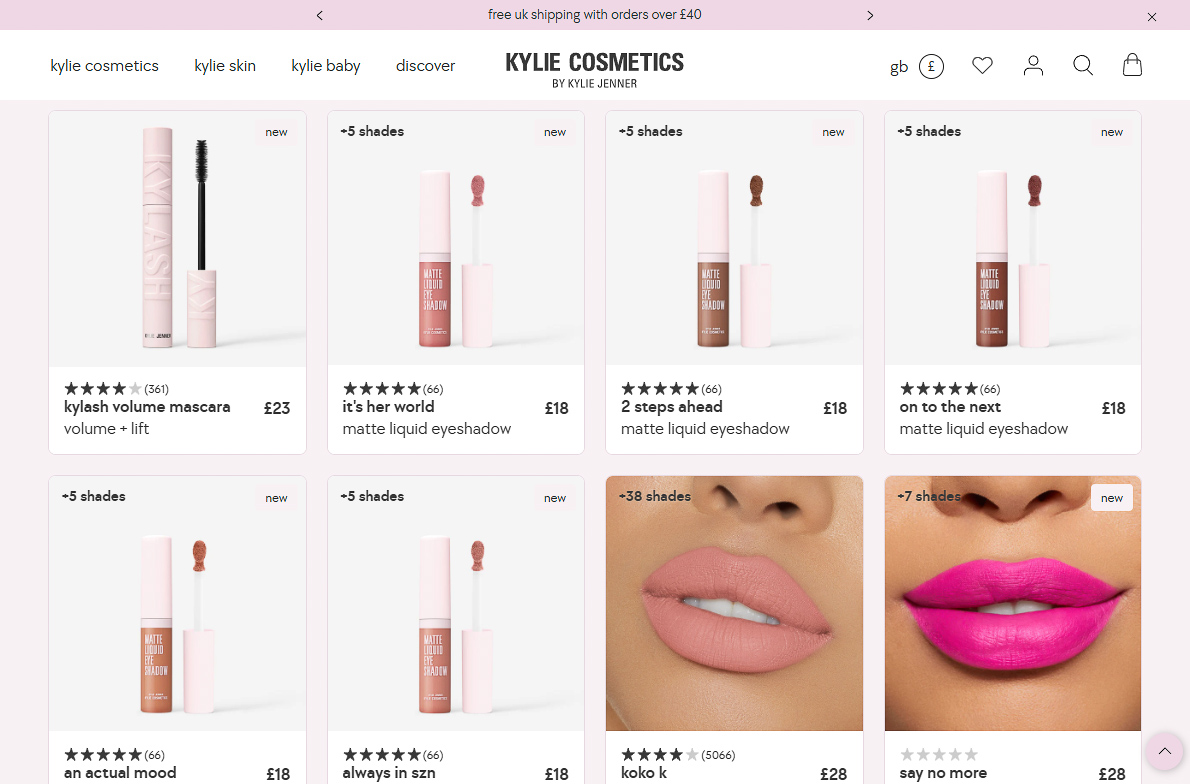
Example: Kylie Cosmetics, a Shopify store, effectively uses influencer marketing, including collaborations with beauty influencers and celebrities.
5. Maximize Social Media Potential with Influencer Marketing
Influencer marketing is not just about brand awareness anymore. It's about creating engaging, authentic content that drives conversions. Consider platforms like TikTok, Instagram, and Facebook for influencer collaborations. Using shoppable posts on Instagram and Facebook Shops can provide a seamless shopping experience for users.
Influencer marketing is a great way to reach a wider audience. Platforms like AspireIQ or Grin can help you manage your influencer marketing campaigns. Shoppable posts on Instagram allow users to buy directly from the app, reducing the steps to purchase.
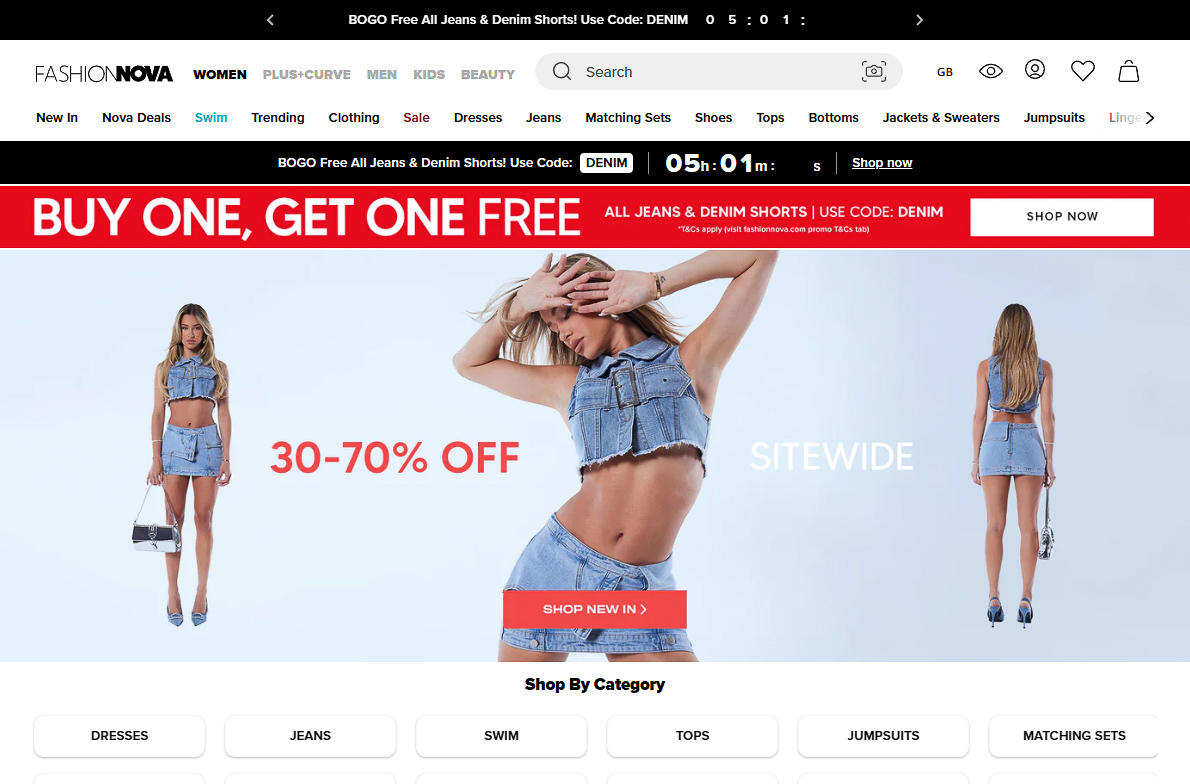
Example: Fashion Nova, a Shopify fashion store, has successfully used influencer marketing on Instagram and TikTok to drive traffic and sales.
6. Harness the Power of Social Commerce and AI Services
Social commerce has taken a leap, with platforms like Instagram and Facebook offering integrated shopping experiences. Utilise these features to reduce the steps between discovery and purchase, increasing conversion rates.
Also, explore Shopify's AI services for personalised product recommendations, customer service automation with chatbots, and predictive analytics for sales forecasting. These can help enhance the customer experience, optimise your inventory, and boost sales.
Integrating your Shopify store with Instagram and Facebook allows users to shop directly from these platforms. You can set up Facebook Shops and Instagram Shopping via your Shopify dashboard.
Moreover, Shopify's AI services can enhance your store's functionality. For instance, Shopify's chatbot, Kit, can automate marketing tasks, while their product recommendation AI can suggest personalised product recommendations to your customers.
Example: Magnolia Market, a home décor Shopify store, effectively uses social commerce with shoppable posts on Instagram and Facebook, providing a seamless shopping experience for their customers.
Getting Started: A Step-by-Step Guide
1. Keyword Research and SEO Optimization:
Start with comprehensive keyword research using tools like SEMrush or Ahrefs. Identify primary and secondary keywords and incorporate them in your product descriptions, titles, meta descriptions, and alt tags. Add schema markup to your Shopify store using available apps.
2. Content Creation:
Create engaging, unique content for your product descriptions and blog posts. Use AI tools to optimise your content with LSI keywords. Regularly update your blog with valuable articles related to your products.
3. Guest Posting:
Identify high-authority blogs in your niche that accept guest posts. Write quality articles for them, and include a link back to your Shopify store. This can enhance your domain authority and improve your search engine rankings.
4. Influencer Collaborations:
Identify influencers in your niche and collaborate with them for promotional campaigns. Engage industry experts for expert roundup posts on your blog.
5. Influencer Marketing and Social Media:
Use platforms like AspireIQ or Grin to manage your influencer marketing campaigns on platforms like Instagram and TikTok. Use shoppable posts and stories on Instagram and Facebook to provide a seamless shopping experience for your customers.
6. Social Commerce and AI Services:
Integrate your Shopify store with Instagram and Facebook for social commerce. Also, explore Shopify's AI services for personalised product recommendations, customer service automation with chatbots, and predictive analytics for sales forecasting.
7. Use AI to personalise your marketing:
AI can help you target your marketing messages more effectively by understanding your customers' interests and needs. For example, you can use AI to create personalised product recommendations or to send targeted email campaigns.
8. Offer great customer service:
Excellent customer service is essential for any successful e-commerce business. Make sure you're responsive to customer inquiries and that you go the extra mile to resolve any issues they may have.
Remember, the world of e-commerce is dynamic and requires continuous learning and adaptation. Stay updated with the latest trends, technologies, and customer behaviour to stay ahead in the game. The key is to test, analyse, and optimise your strategies based on your performance data and changing market trends.
In conclusion, the key to driving traffic and sales on your Shopify store in 2023 is a blend of advanced SEO practices, high-quality content, influencer collaborations, and the intelligent use of AI services and social commerce. Always remember to keep testing, analysing, and optimising your strategies based on your performance data.
Of course, no matter what trends you're following, it's important to remember that the key to success in e-commerce is providing a great customer experience. That means offering high-quality products, competitive prices, and excellent customer service. If you can do that, you'll be well on your way to driving traffic and sales on your Shopify store in 2023.
However, if you find it challenging to navigate the complexities of setting up a Shopify store or optimizing your existing one, don't worry - BBNDRY is here to help! As a bespoke website design agency, we specialize in building stunning, high-performing Shopify sites tailored to your unique needs. Get in touch with us today, and let's start creating a Shopify experience that your customers will love and your competitors will envy. Reach out to BBNDRY now for your custom Shopify solution!










